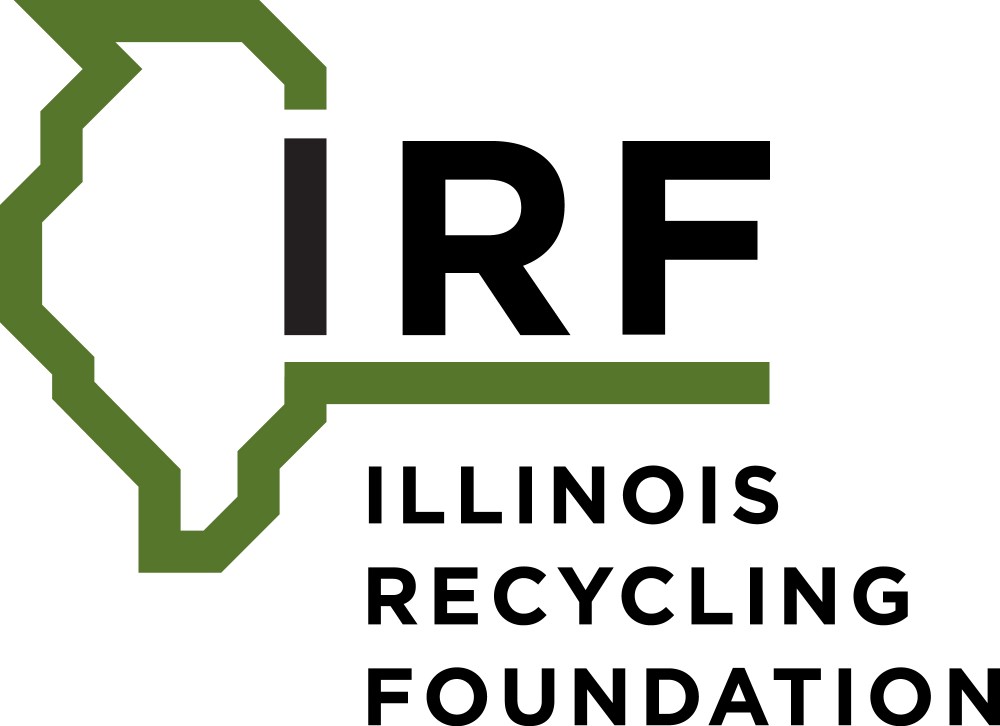Something Different Was Happening in Peoria
Walk into most industry conferences and you'll find people clustered by sector—government folks here, private industry there, educators in their own corner. But something unusual was happening at the Embassy Suites in East Peoria on October 14-15. County solid waste managers were deep in conversation with AI researchers. State legislators were comparing notes with composting facility operators. And everyone seemed genuinely excited to be there.
This was the 2025 Illinois Circularity Conference presented by Recycle Coach, and it marked a first for Illinois: three major organizations—the Illinois Counties Solid Waste Management Association (ILCSWMA), the Illinois Recycling Foundation (IRF), and the SWANA Land of Lincoln Chapter—decided to join forces rather than host separate events. With Recycle Coach as the presenting sponsor, the conference brought together more than 200 people who rarely share the same room, all united by a common frustration: the old way of doing things simply isn't working anymore.
That shift in thinking—from managing waste to preventing it—is exactly what the organizers hoped to spark. By choosing "Circularity" instead of the usual "Waste Management Conference," they were sending a signal: we're ready to have bigger conversations. Conversations about product design, about who pays for recycling, about turning food scraps into soil instead of methane. The kind of conversations that require manufacturers, government officials, and community activists to actually work together.
And judging by the packed sessions and animated discussions spilling into the hallways? People were ready to have those conversations.
.jpg)
Recycle Coach and LRS cut the ribbon to officially open the 2025 Illinois Circularity Conference
A Lifetime of Making a Difference: Marta Keane's 37-Year Journey
If there was a single person who embodied the spirit of the conference, it was Marta Keane, the recipient of this year's Steve Apotheker Award for Recycler of the Year. But to understand why Keane received a standing ovation when she accepted her award, you need to understand what 37 years of dedication to recycling actually looks like.
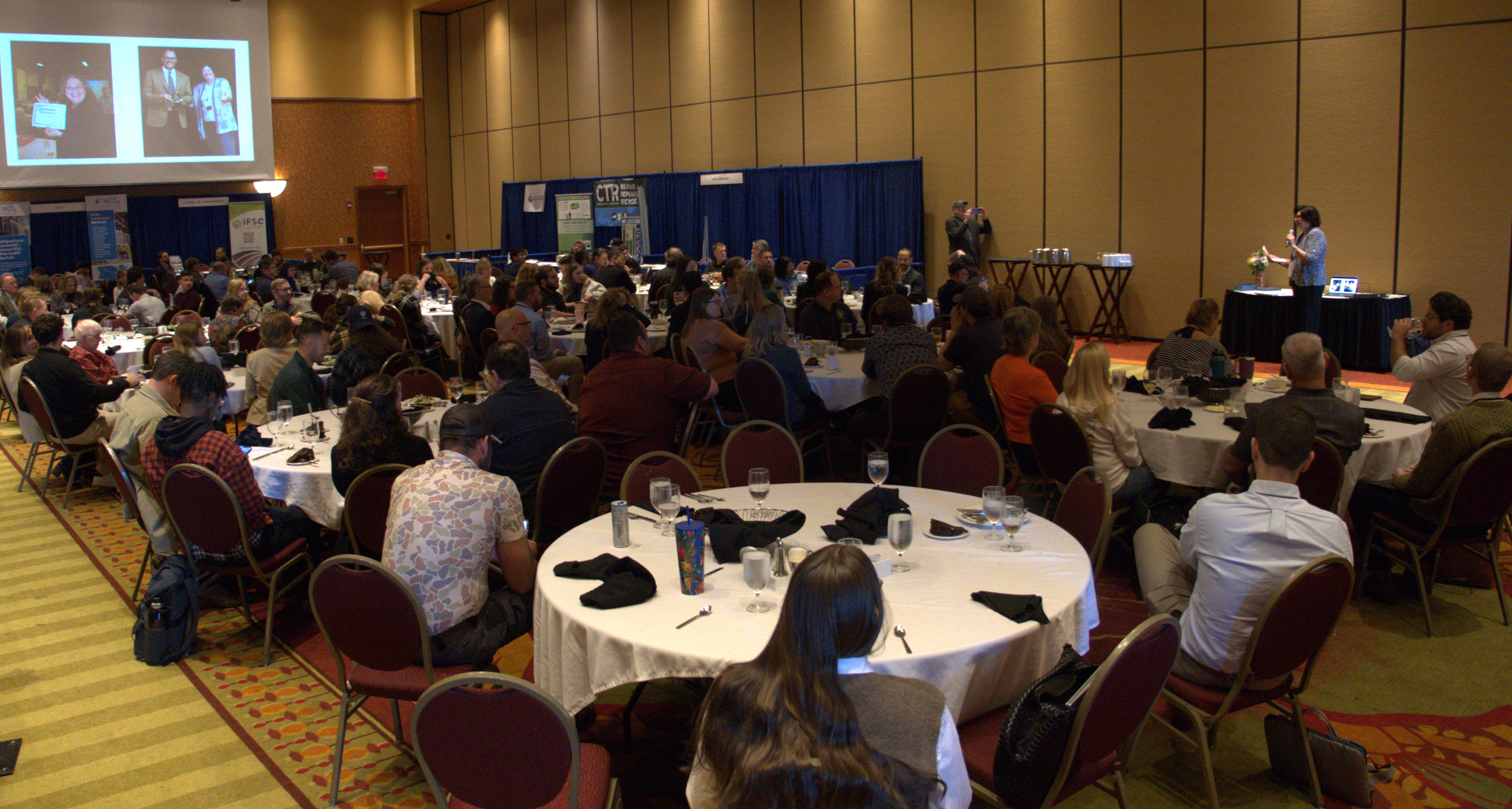
Marta Keane accepts the Steve Apotheker Recycler of the Year Award
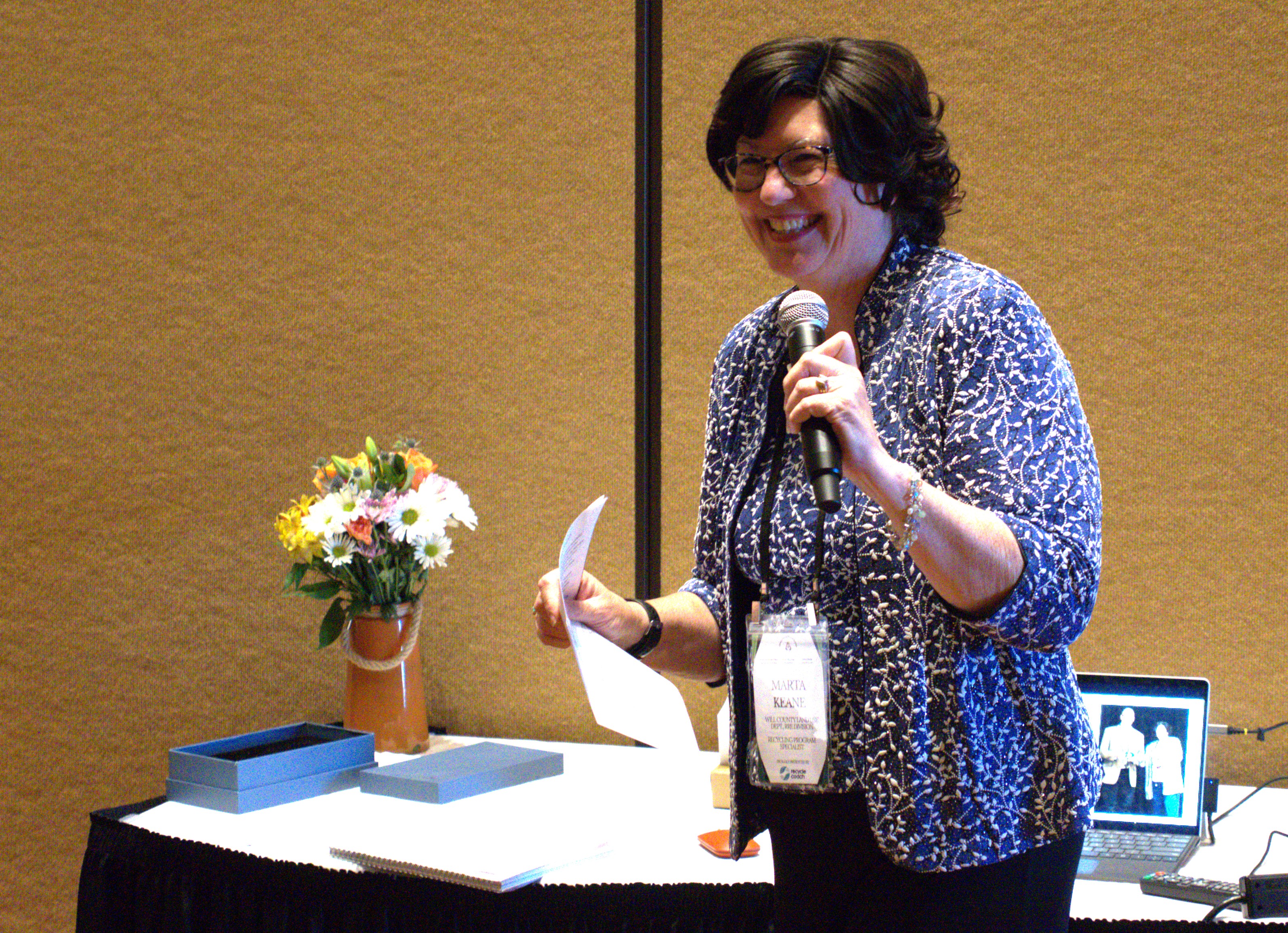
Marta shares her thoughts after receiving the award
It was 1988 when Keane, a recent graduate of DeSales University in Pennsylvania, took her first job in the environmental field at a recycled greeting card company in Chicago. The industry was young, recycling was still novel, and most people saw it as a fringe movement. But Keane saw something different: an opportunity to fundamentally change how society thinks about waste.
The Pioneer Years
By 1992, Keane had moved from the private sector to public service, becoming the Recycling Coordinator for the City of St. Charles. She became one of the first State of Illinois certified Recycling Trainers, helping to establish the standards and practices that would guide the industry for decades. She successfully created a Green Team at a Fortune 500 company and earned awards for pioneering multi-family recycling programs—work that seems routine today but was groundbreaking in the early 1990s.
But it was in Naperville where Keane truly made her mark as a trailblazer. As the city's only Environmental Programs Administrator, she ran what became one of the busiest Household Hazardous Waste collection sites in the entire United States. And in 1996, she organized something that had never been done in the Midwest: a large-scale electronic recycling event. Remember, this was years before e-waste recycling became common, before anyone really understood the environmental impact of discarded electronics. Keane saw it coming and acted.
"She's always been ahead of the curve," one long-time colleague noted. "While everyone else was still figuring out curbside recycling, Marta was already thinking about electronics, household hazardous waste, and building partnerships that would make programs financially sustainable."
Building Systems That Last
For over 20 years now, Keane has served as Will County's Recycling Specialist, a role that requires equal parts technical expertise, political savvy, and educational skill. She writes the County's Solid Waste Plan updates—the blueprints that guide waste management for years. She establishes permanent drop-off programs through intergovernmental agreements, turning temporary solutions into lasting infrastructure. She offers one-day special collection events that give residents options for hard-to-recycle materials. She established WillCountyGreen.com, a comprehensive website with a searchable database that helps residents find recycling options by city and material type.
But Keane's influence extends far beyond Will County. She has been a member of the Illinois Recycling Association since 1992, serving on the board multiple times and holding every major leadership position: Secretary, Treasurer, Vice President, and President. When the association split into two organizations in 2020 to better serve members' needs, Keane became the first President of the newly formed Illinois Recycling Foundation, the 501(c)(3) educational arm focused on public outreach and education.
Leading the Charge for Producer Responsibility
As Chair of the Illinois Product Stewardship Council, Keane has been at the forefront of one of the most important policy battles in waste management: making producers responsible for the end-of-life management of their products. Under her leadership, Illinois passed what many consider the most advanced electronics Extended Producer Responsibility (EPR) law in the nation. The council successfully implemented the Medication Take Back law in 2023, giving residents safe options for disposing of unwanted pharmaceuticals. Improvements to paint collection programs rolled out in 2024. And on January 1, 2026, a comprehensive statewide battery collection program covering all battery types will launch—the direct result of legislation championed by Keane and her colleagues.
For this work, Keane, along with colleagues Walter Willis and Christina Seibert, received the prestigious "Local Leader" award from the Product Stewardship Institute at their 2025 U.S. Product Stewardship Forum in Chicago. The national recognition underscored what Illinois insiders already knew: the state's leadership in sustainable materials management is due in large part to Keane's tireless advocacy and strategic thinking.
Making Recycling Simple Again
Most recently, Keane played a key role in developing the "Feed the Cart" campaign, the largest recycling education and outreach campaign in Illinois history. Backed by a $2 million EPA grant, the campaign unites 280 municipalities across six counties with a simple message: Put the right things in your recycling bin, and keep the wrong things out. It's education at scale, reaching millions of residents through billboards, social media, and community outreach. The goal is ambitious: increase regional recycling rates by 15% before 2030.
"The beauty of the Feed the Cart campaign is that it acknowledges what Marta has always known," said one campaign organizer. "People want to recycle. They want to do the right thing. They just need clear, consistent information. That's what Marta has been providing for 37 years."
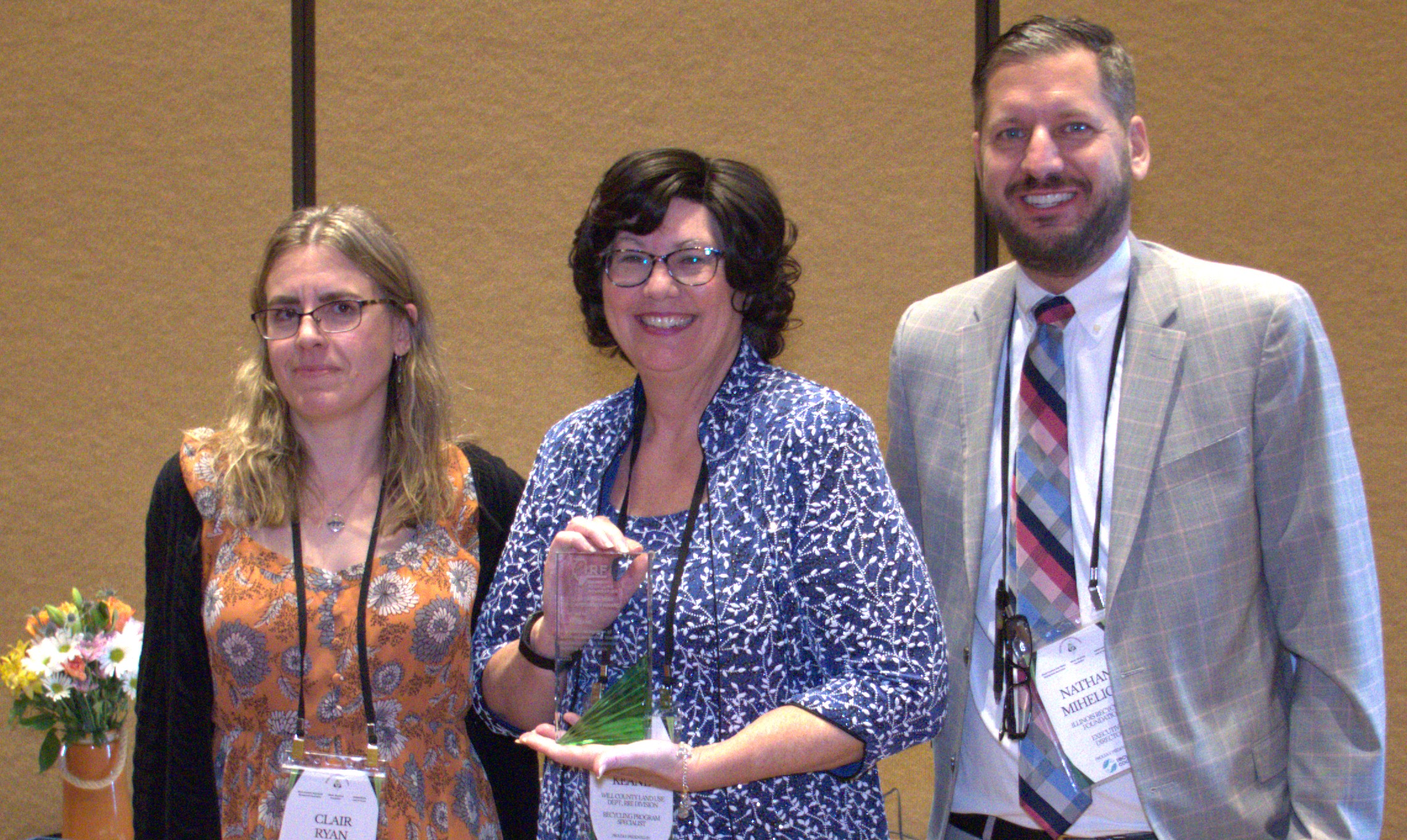
Clair (left), Marta Keane (center), and Nathan (right) celebrate after the award ceremony
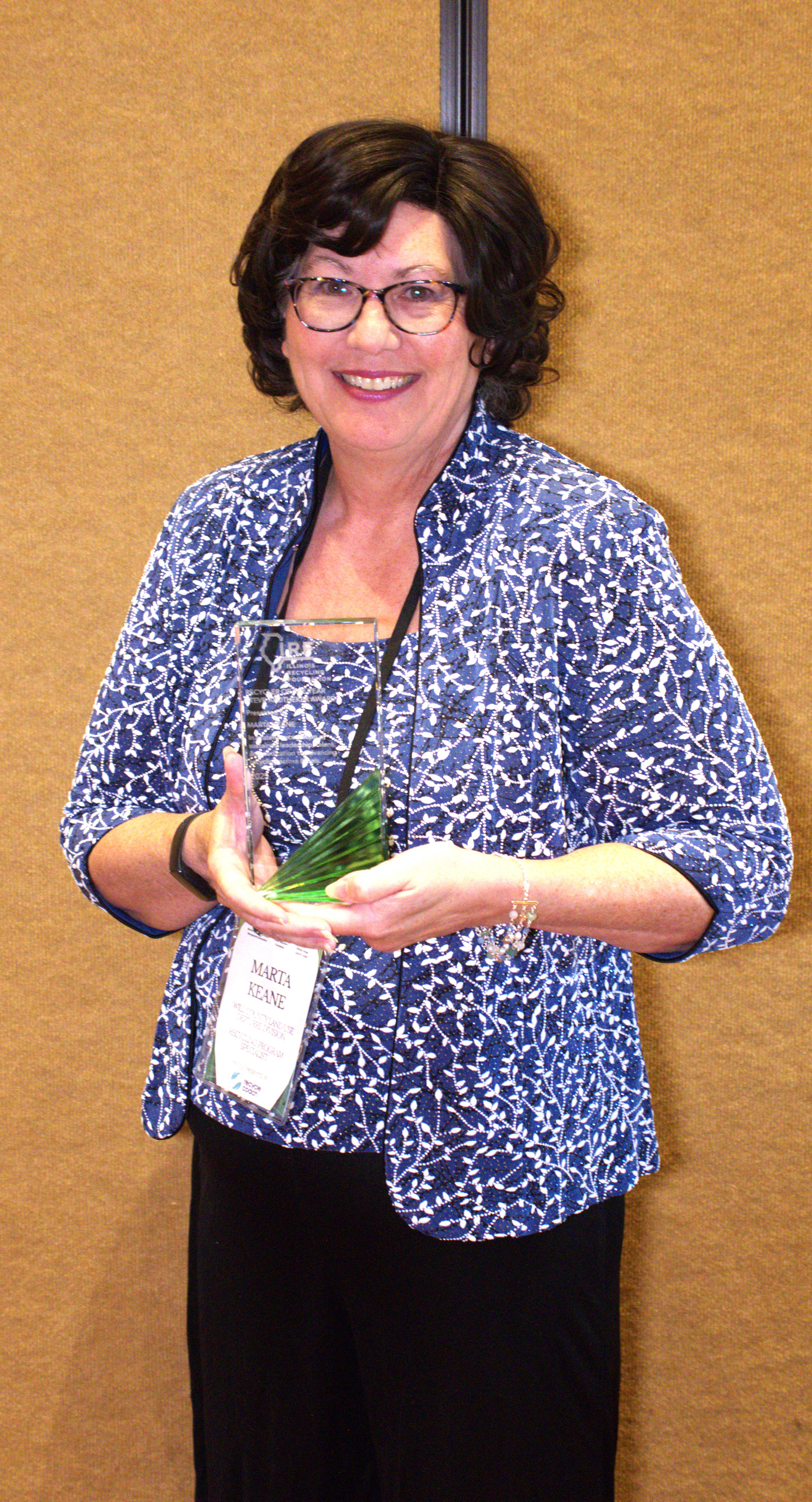
Marta Keane proudly displays her Steve Apotheker Recycler of the Year Award
When Marta Keane took the stage to accept the Steve Apotheker Award, she didn't talk about her achievements. She talked about her peers—the other recycling coordinators, waste managers, and activists who inspire her every day. She talked about the challenges ahead: contamination, funding, policy barriers. And she talked about hope: the belief that Illinois can build a truly circular economy where nothing is wasted and everything has value.
"I've watched Marta work for over two decades," one colleague said after the ceremony. "She doesn't do this for awards. She does it because she genuinely believes we can do better. And then she goes out and proves it, one program, one partnership, one resident at a time."
That's what 37 years of dedication looks like. And that's why, when the Illinois Circularity Conference wanted to honor excellence, Marta Keane's name was the obvious choice.
Three Organizations, One Vision
If you've worked in the recycling and waste industry in Illinois, you know ILCSWMA, IRF, and SWANA. Each organization has its own loyal following and distinct personality. So when they announced they were combining forces for a joint conference, people took notice.
The reason was simple but powerful: the biggest challenges facing Illinois can't be solved by any one group alone. A new state policy doesn't matter if counties can't implement it. Public education campaigns fall flat if facility operators aren't equipped to handle what residents put in their bins. And professional standards mean nothing if local governments can't afford to adopt them.
"Separately, we're three good organizations," one organizer noted. "Together, we cover every angle—from the policy that gets written in Springfield to the bin that sits on someone's curb. That's the kind of coverage we need to actually move the needle."
By co-hosting a single conference, the organizations intentionally broke down the traditional silos. A new policy framework discussed in a SWANA-led session could be immediately vetted for practical implementation challenges by ILCSWMA members and translated into a public education campaign by the IRF—all within the same event.
The Sessions Everyone Was Talking About
With three parallel tracks running over two days, attendees had tough choices to make. Do you learn about the latest AI innovations, dive into the nitty-gritty of PFAS regulations, or hear about real-world success stories from other counties? The variety was impressive, but a few sessions clearly hit a nerve.
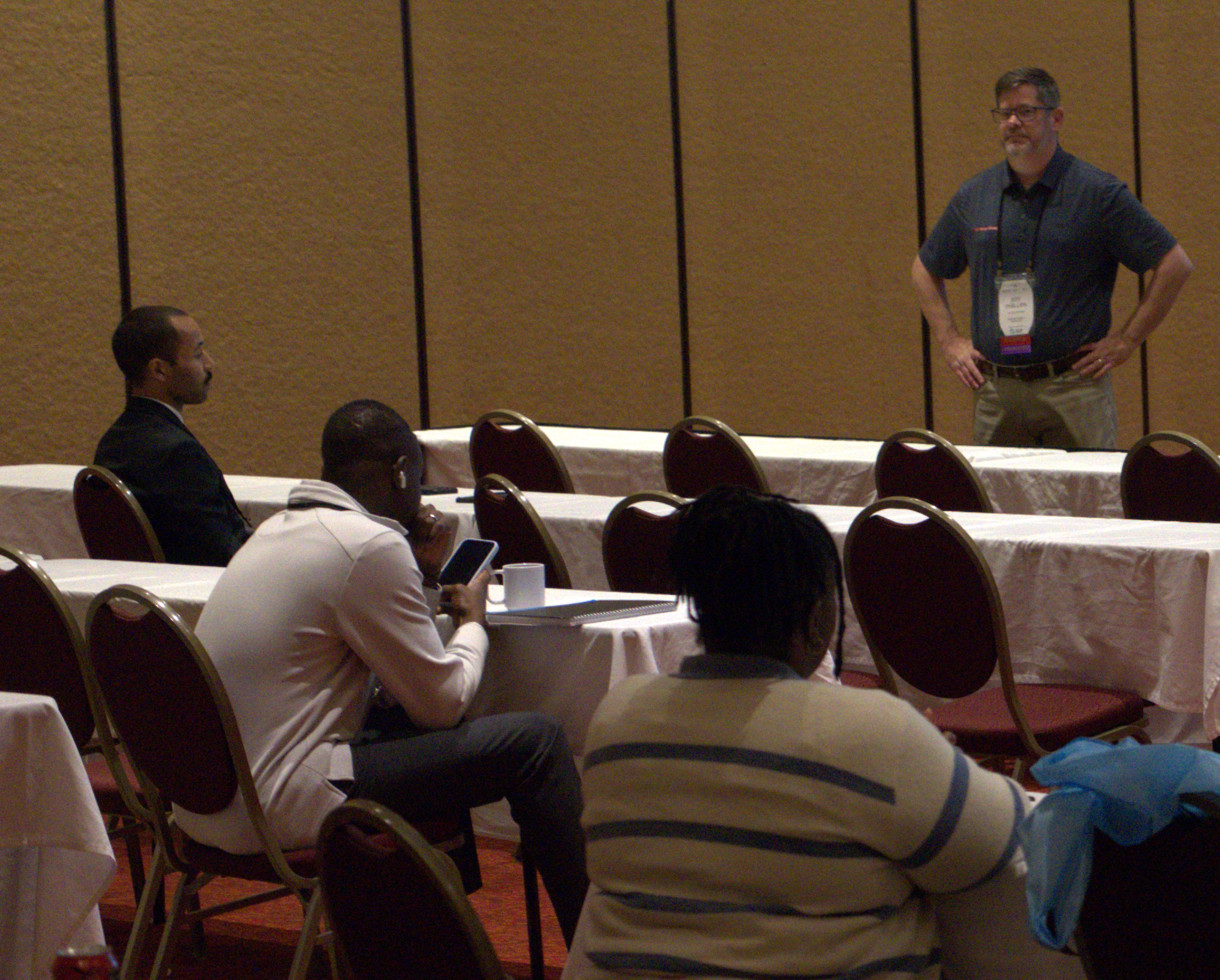
Attendees engaged in an educational session
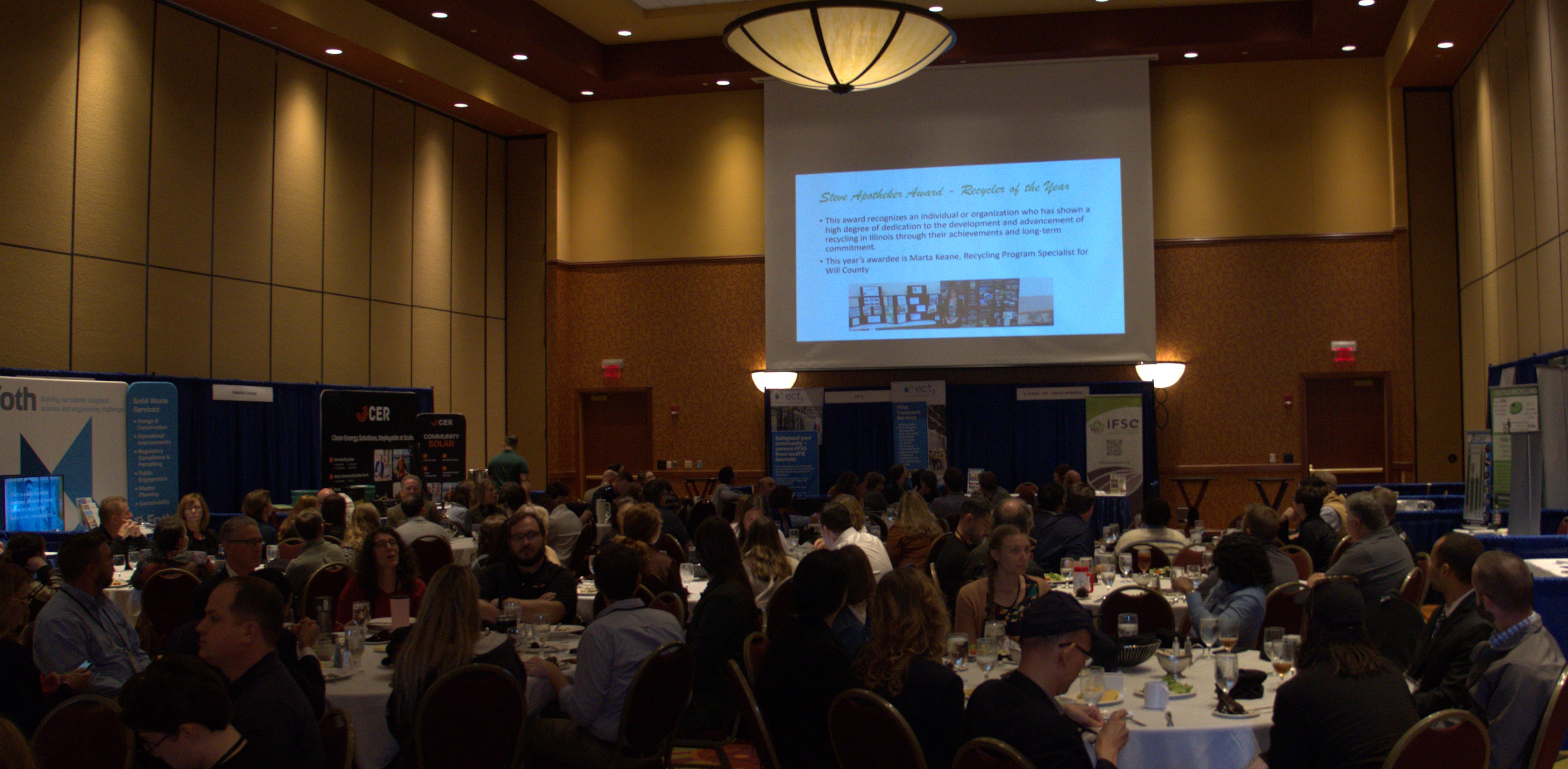
The plenary session room filled with participants
The EPR Debate: Will Illinois Be Next?
If there was a "standing room only" session, it was "Is There a Path to Packaging EPR in Illinois?" Extended Producer Responsibility—the idea that companies should pay for recycling the packaging they create—has been adopted in several states and throughout Europe. But it remains controversial. Manufacturers worry about costs and complexity. Local governments see it as a potential funding solution. The session didn't promise easy answers, but it gave people a chance to hash out the pros and cons with experts Kaitlin Reese and Christina Seibert. By the end, even the skeptics admitted it was a conversation worth continuing.
PFAS: The Forever Problem
The technical session on "PFAS and Leachate Management" drew a crowd that might have preferred to avoid the topic entirely. Per- and polyfluoroalkyl substances—nicknamed "forever chemicals" because they don't break down—are showing up in landfill leachate across the country. Managing them is expensive, complicated, and increasingly unavoidable as regulations tighten. "This is the stuff that keeps me up at night," admitted one landfill manager. But at least now he knew he wasn't alone—and he left with some practical strategies for dealing with it.
When Recycling Facilities Catch Fire
Lithium-ion batteries in the recycling stream have sparked more than just debates—they've literally sparked fires at facilities across Illinois. The session "Getting Heated Over Fire Risks and Response" addressed this growing safety crisis. From damaged batteries in recycling trucks to explosive incidents at processing facilities, the problem is getting worse as more devices with lithium batteries enter the waste stream. The session offered practical prevention strategies and emergency response protocols, turning a scary topic into actionable knowledge.
The Softer Side of Circularity
Textiles and mattresses might seem like small problems compared to PFAS contamination, but they represent huge volumes and thorny logistics. The session "Circularity's Softer Side" explored innovative approaches to diverting these materials from landfills—from textile recycling programs that turn old clothes into insulation to mattress deconstruction operations that recover steel, foam, and fabric. It was a reminder that circular solutions often require creativity more than complicated technology.
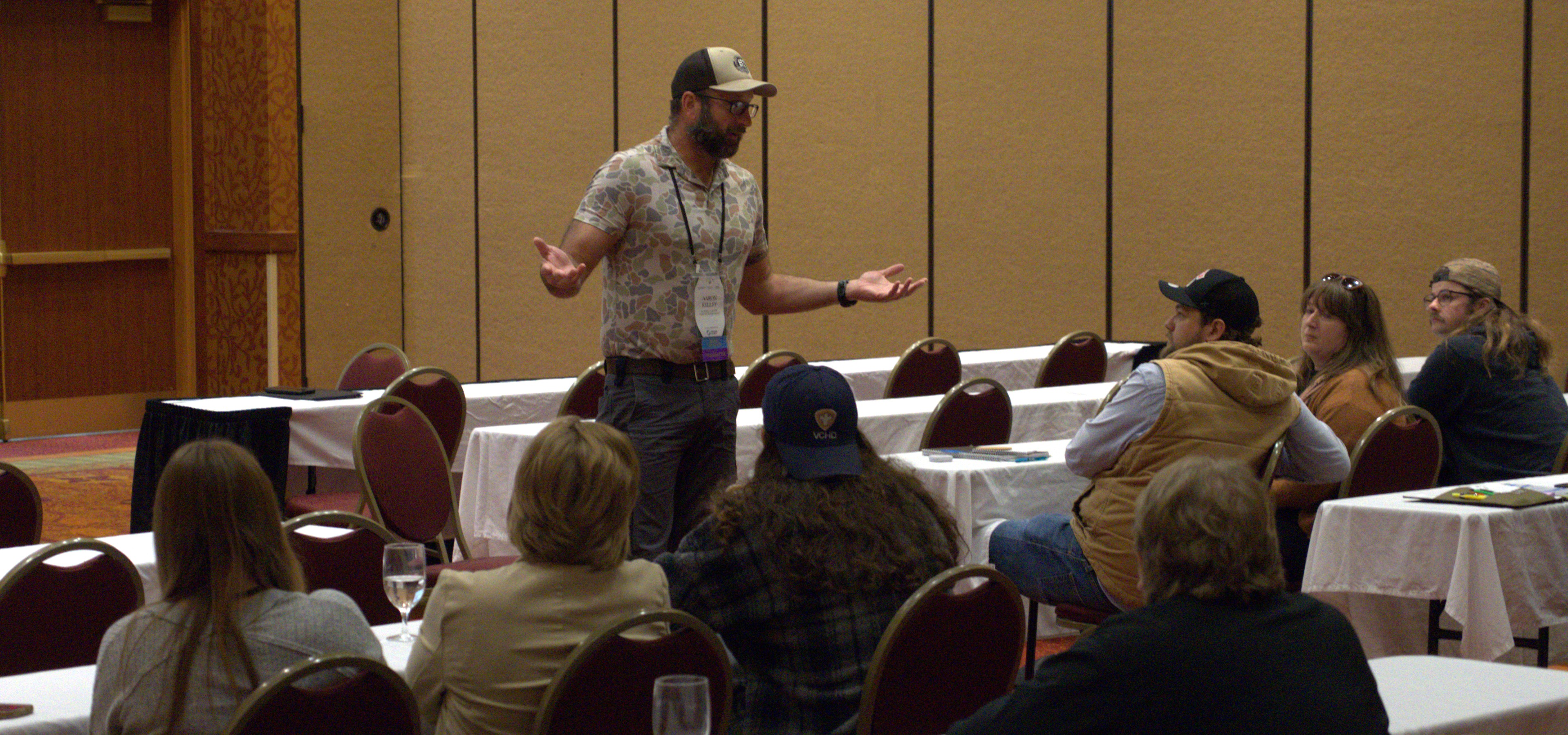
Attendees discuss circular economy strategies during a breakout session
The Voices That Set the Tone
Great conferences aren't just about topics—they're about the people who bring those topics to life. This year's lineup brought together political clout, regulatory authority, and academic innovation in ways that kept people engaged from the opening remarks to the closing reception.
.jpg)
The plenary hall at the Illinois Circularity Conference
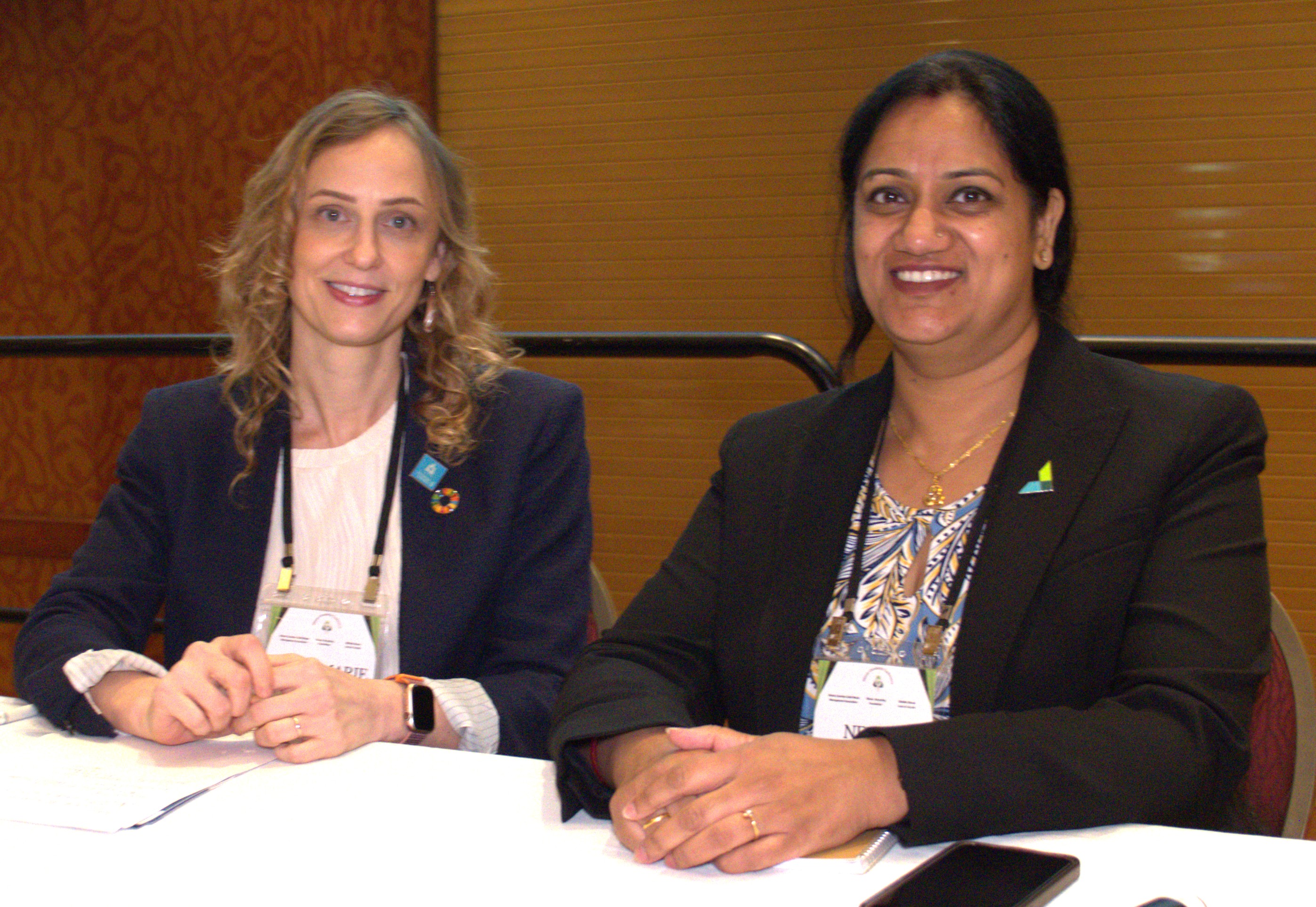
Keynote speakers address the conference
Senator Koehler: Making Change in Springfield
When State Senator David Koehler took the stage for the opening keynote, people leaned in. This wasn't a token political appearance—Koehler has street cred in the sustainability world. He's the legislator behind the law requiring battery recycling stewardship programs and the force that got the Renewable Energy Component Recycling Task Force off the ground. His message was clear: Illinois is ready for bold policy moves, but only if the people in this room help shape them. "Don't wait for perfect legislation," he challenged the audience. "Come to Springfield and help us write better laws."
.jpg)
State Senator David Koehler delivers the opening keynote address
James Jennings: The Regulator Who Gets It
James Jennings, Director of the Illinois EPA, led the plenary on "Protecting Illinois," and his credibility was instant. Before leading the agency, he was one of them—serving on the SWANA board, working with IRF, managing materials and compliance. He didn't talk down to the audience or hide behind bureaucratic language. Instead, he laid out the EPA's priorities clearly and invited feedback. "We can't protect Illinois without you," he told the room. "You're the ones who see what's actually happening on the ground. We need that intel to make smart regulations."
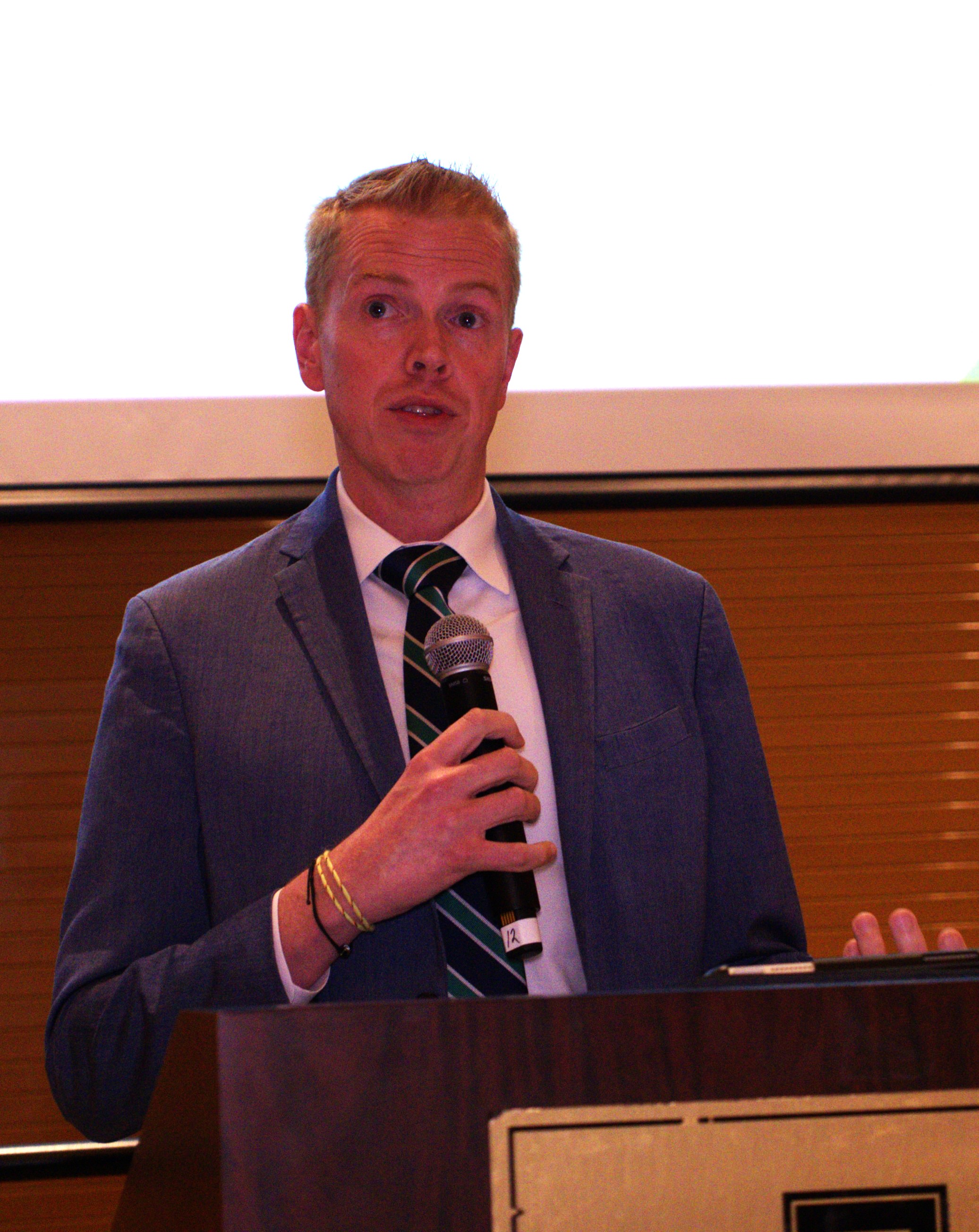
IEPA Director James Jennings addresses attendees
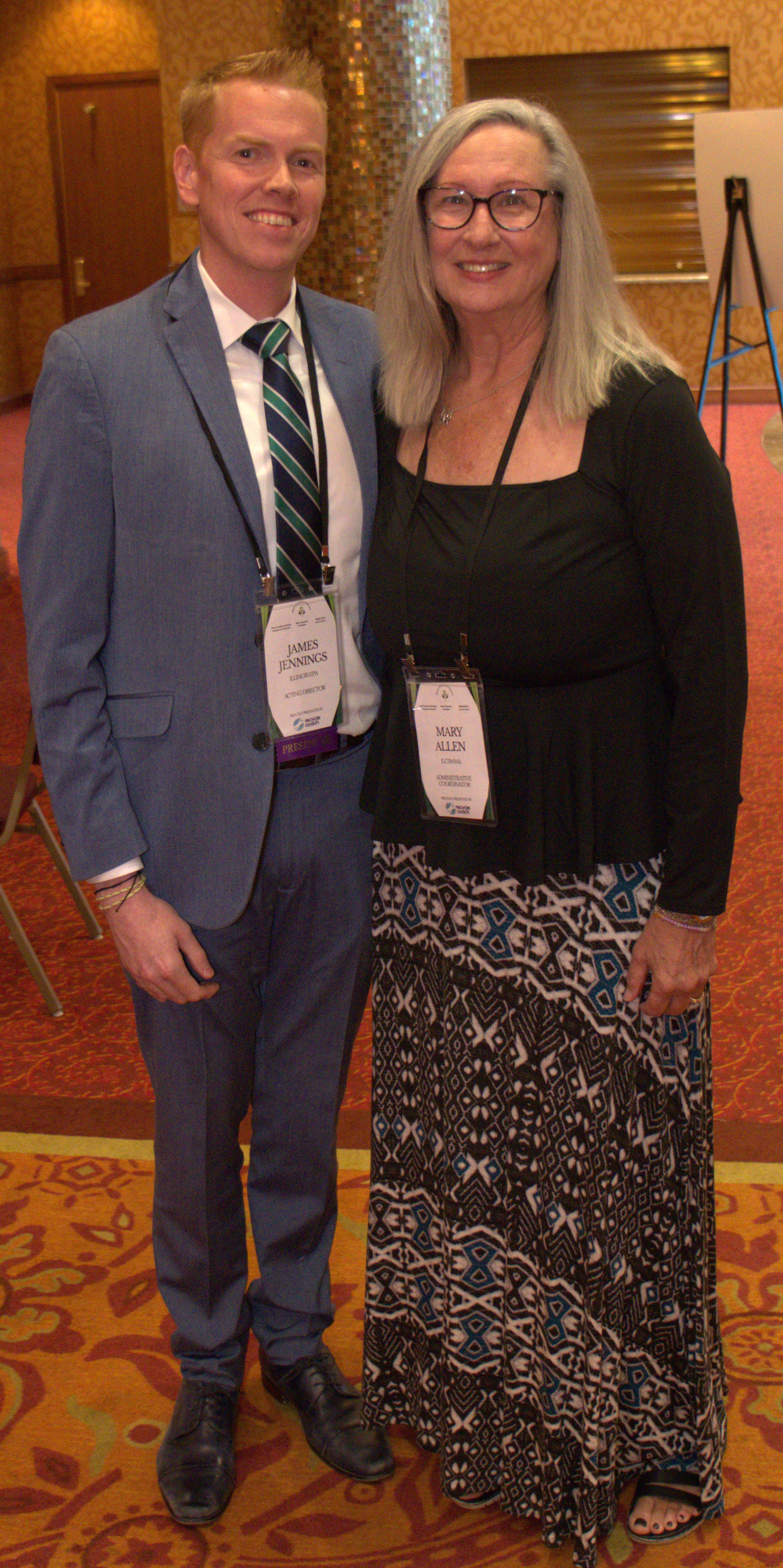
Mary from ILCSWMA with IEPA Director James Jennings
The Future: AI Meets Circularity
Perhaps the most unexpected—and exciting—presentation came from a team at the University of Illinois Springfield presenting their "Circular Economy Startup Simulator." Dr. Anne-Marie Hanson brought environmental expertise, Hei-Chi Chan brought AI and systems thinking, and Dr. Neetu Singh brought business analytics. Together, they demonstrated how artificial intelligence could help identify opportunities for circular business models that actually make money.
It wasn't just theoretical. They showed real examples of how data mining could reveal waste streams valuable enough to build a business around, and how predictive analytics could help companies design products for easier recycling. For an audience used to thinking about circularity in terms of bins and trucks, it was a glimpse into a future where algorithms might be just as important as collection schedules.
"Ten years ago, we were just trying to get people to recycle," reflected one long-time attendee. "Now we're talking about AI-powered circular economy startups. That's progress."
Celebrating Excellence: 2025 IRF Awards
Awards ceremonies can feel perfunctory, but not this one. When the Illinois Recycling Foundation presented its annual awards, the room erupted with genuine appreciation for people whose work often goes unnoticed. As detailed earlier, the prestigious Steve Apotheker Award went to Marta Keane of Will County for her 37-year career of pioneering work in recycling, product stewardship, and environmental education.
Helping Hands: Tackling the Textile Mountain
Helping Hands Textile Recycling has been recognized with the Outstanding Private Sector Program Award for its continued dedication and efforts in textile recycling. Accepting the award on behalf of Helping Hands is company representative Gina Peshek, whose commitment and proactivity have been instrumental in expanding the company's impact.
Each year, Americans discard more than 11 million tons of clothing & textiles, a majority ending up in landfills. Helping Hands has been fortunate enough to help countless Illinoisans responsibly discard their clothing through events and convenient drop-off bins, effectively diverting millions of pounds away from landfills each year. Their efforts have allowed millions of items to be reused or recycled globally.
This recognition not only highlights Helping Hands' achievements toward more sustainable practices but also the dedication of employees like Gina, who continue to effect change and drive innovation in the textile recycling community.
Diverted at SSC's CHaRM Center since 2023
Earliest recycler to join Cook County's CHaRM Center
Supported zero-waste internship program at SSC
Nominated by Anthony Daniel Tindall, MP (Cook County):
I would like to nominate Helping Hands for the IRF Award. Justification: In 2023, Cook County created the Center for Hard to Recycle Materials ("CHaRM Center") at the South Suburban College. To date the CHaRM Center has been able to divert over 1.3 million pounds of materials away from the landfill. This success would not have happened without the support of local recyclers, like Helping Hands. Helping Hands was the first recycler to partner with the County on the CHaRM Center. In addition to Helping Hands managing the clothing and textiles program at the CHaRM Center, Helping Hands also worked with the County in expanding clothing and textile recycling programs throughout the South Suburbs of Cook County, an area with traditionally low recycling rates. Finally, Helping Hands partnered with the County in helping to fund the South Suburban College's zero waste internship program at the CHaRM Center.
— Anthony Daniel Tindall, MP
Leaders at the CHaRM Center underscore the same impact: Helping Hands "goes above and beyond for all their clients," consistently showing up with the capacity, professionalism, and community focus required to turn a regional challenge into measurable diversion.

Gina Peshek at the Helping Hands exhibitor booth
McHenry County College: Building a Culture of Sustainability
The third award of the evening went to the McHenry County College Sustainability Center for Outstanding Public Sector Program. Barb Day from McHenry County, who also serves as a board member for the Illinois Recycling Foundation, accepted the award on behalf of the center. The recognition acknowledges the college's comprehensive approach to building sustainability into campus life—not just through recycling bins, but through education, community engagement, and creating the next generation of environmental leaders. When educational institutions take sustainability seriously, they multiply their impact by inspiring students who will carry those values into their careers and communities.
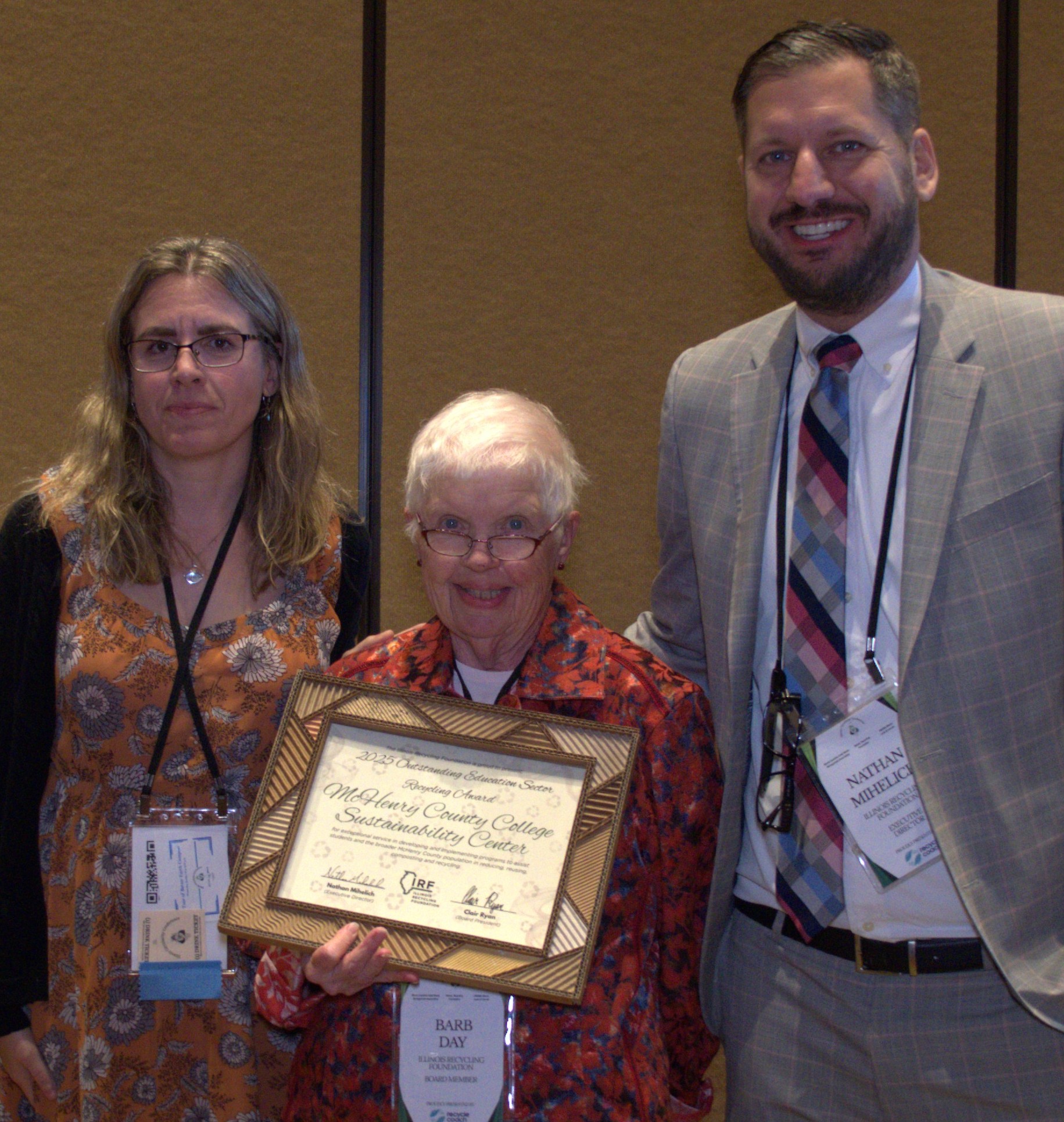
Clair (left), Barb Day, and Nathan from the Illinois Recycling Foundation
The Supporting Cast
Beyond the formal sessions and awards, the conference ecosystem included sponsors and partners whose work makes circularity possible at scale.
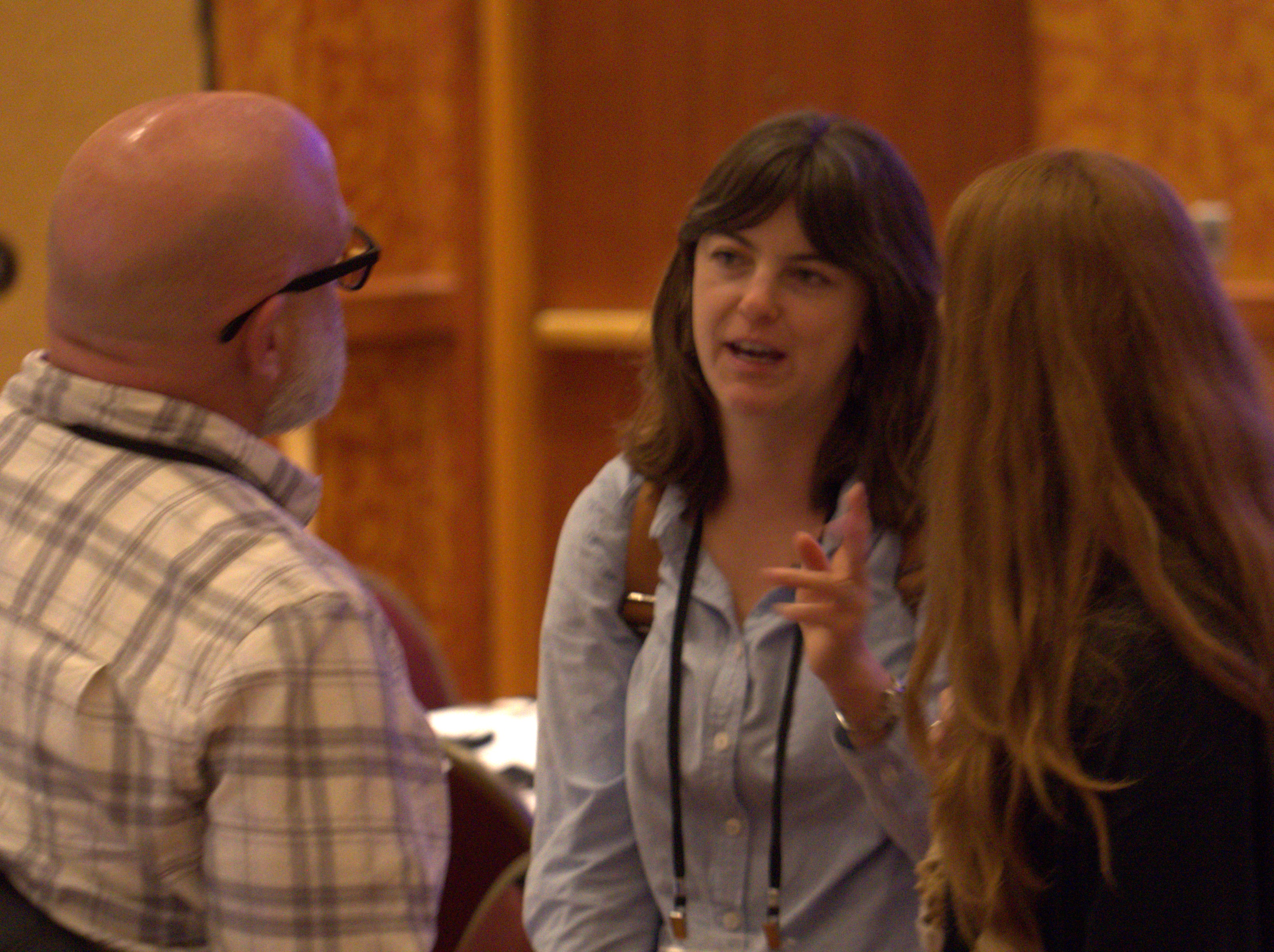
Attendees network and exchange ideas
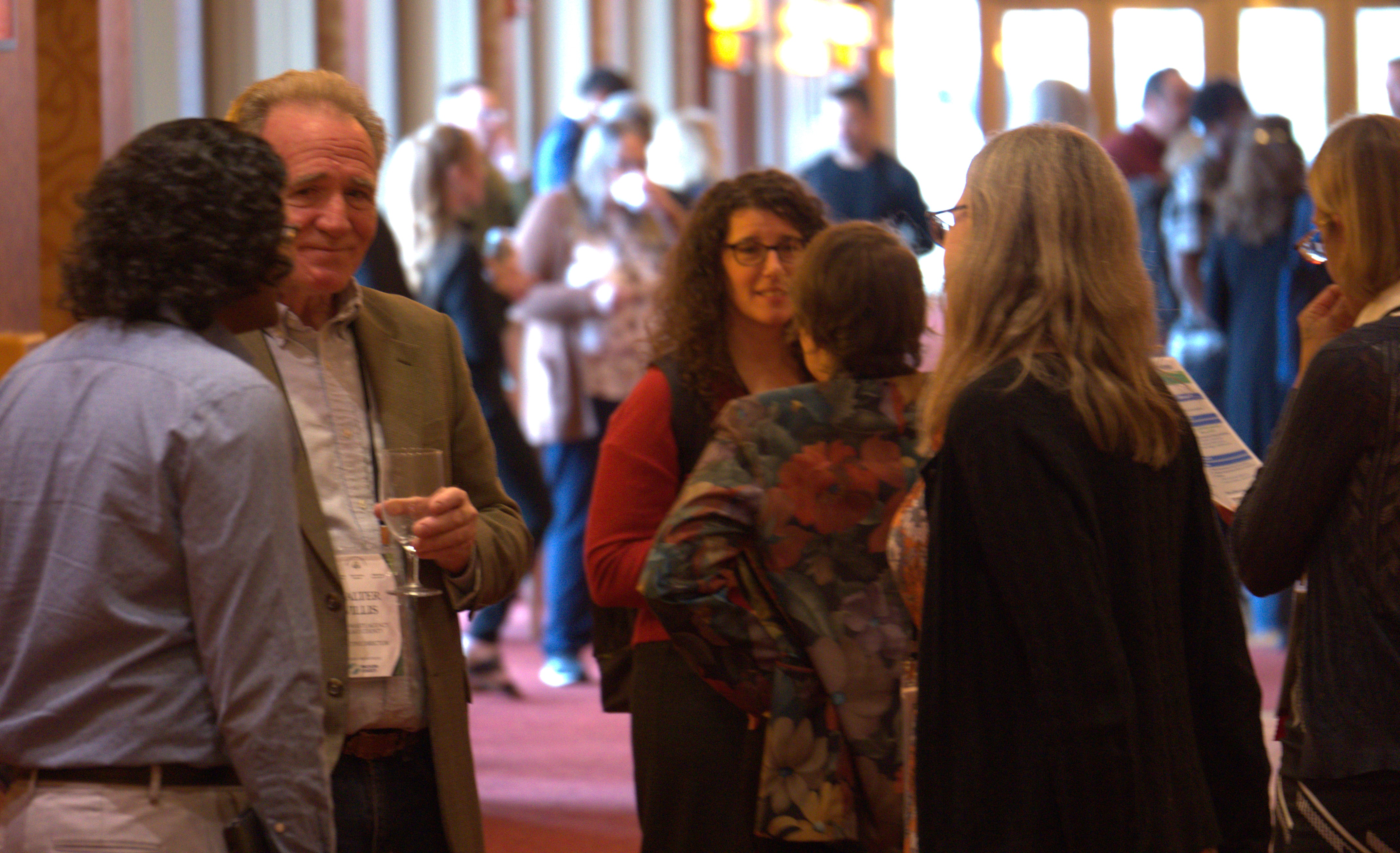
Conversations continue in the hallways between sessions
Recycle Coach: Making Recycling Less Confusing
As the presenting sponsor, Recycle Coach wasn't just a name on a banner—they were solving a problem everyone in the room understood. Recycling rules vary wildly from town to town. What's recyclable in Chicago might be trash in Peoria. Recycle Coach's digital platform helps municipalities give residents clear, personalized information about what goes in which bin. It's the kind of tool that reduces contamination and makes everyone's job easier—from the resident wondering about that yogurt container to the facility operator dealing with the consequences of confusion.
CRC: The Industrial Recycling Partner
CRC Recycling represented the industrial side of circularity—the companies that help businesses figure out what to do with specialized waste streams. Need a waste audit? They'll do it. Have hard-to-recycle materials? They'll find a solution. Want sustainability reporting that impresses your stakeholders? They've got the data. Their sponsorship reminded attendees that circular economy principles work at every scale, from household recycling bins to manufacturing facilities.
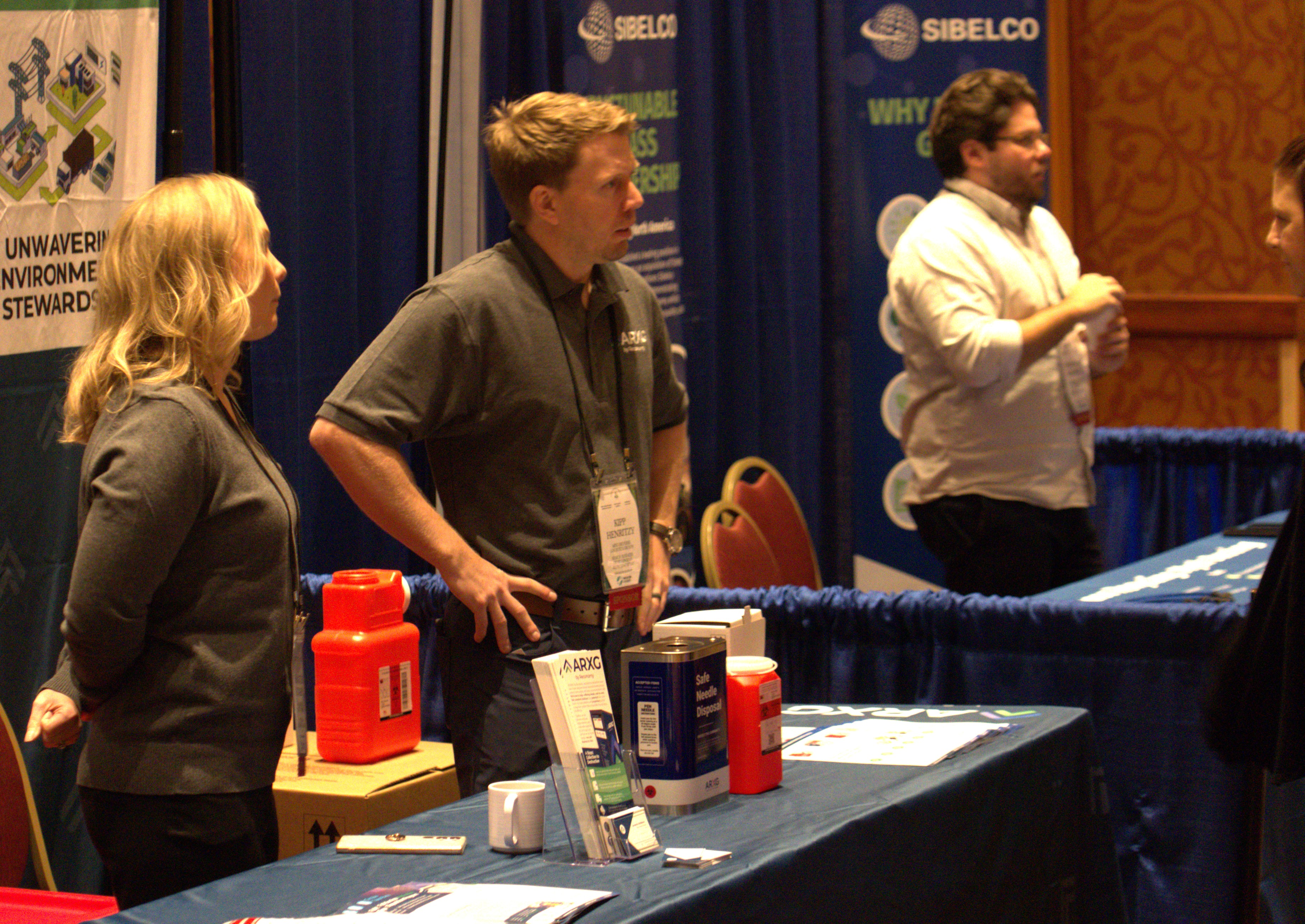
The exhibitor area buzzing with activity
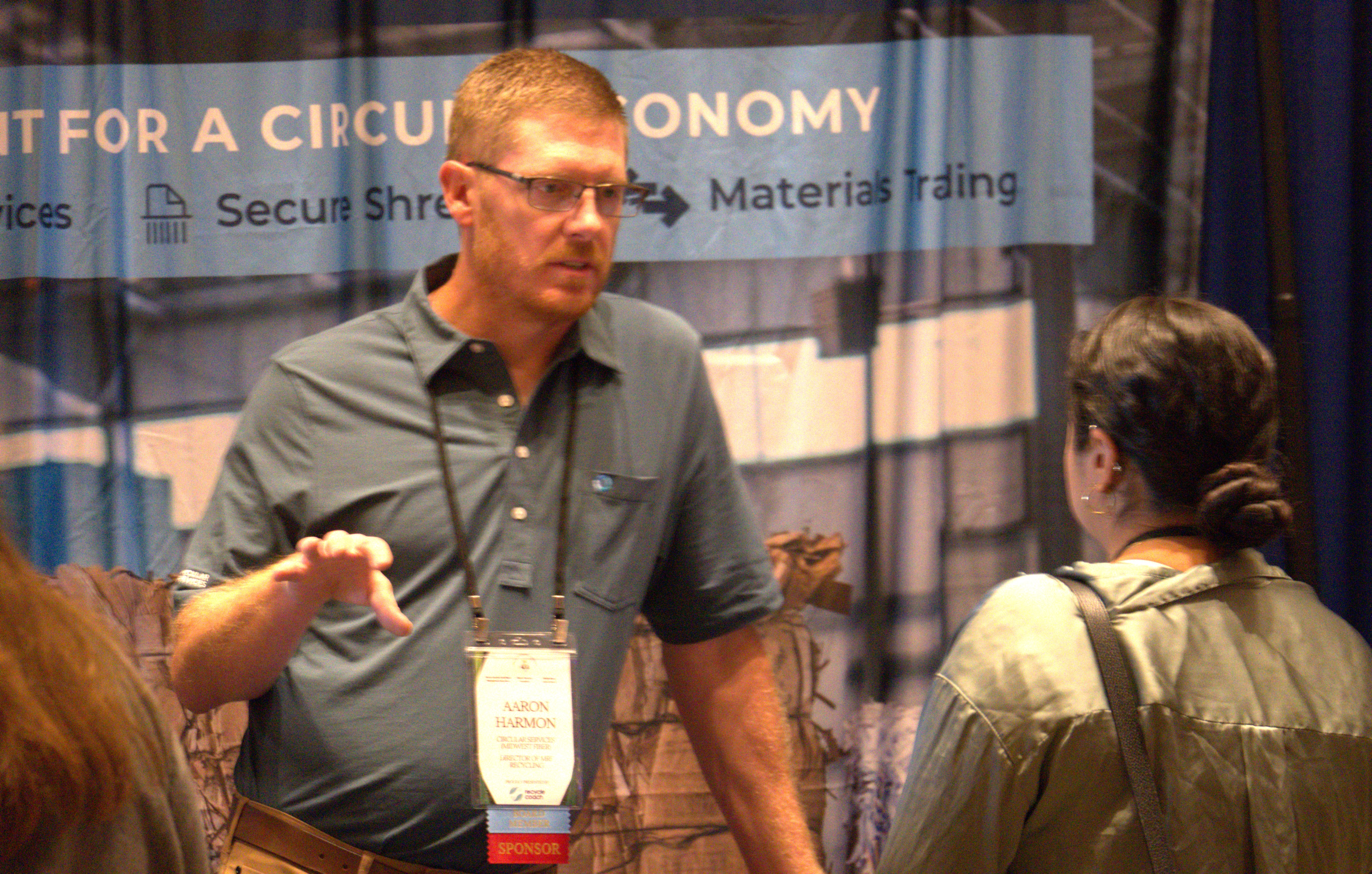
Aaron Harmon from Midwest Fiber at his exhibitor booth
Finding Its Place
Illinois hosts plenty of sustainability conferences. The iSEE Congress at U of I focuses on academic research. The SRI Congress brings together international sustainability leaders. But this conference had a different feel—more practical, more grounded, more immediately useful. "I can't implement a research paper," one county coordinator explained. "But I can implement what I learned here on Monday morning."
What Happens Next?
As attendees filtered out of the Embassy Suites on Tuesday afternoon, the real question lingered: would this energy translate into action, or would everyone go back to their silos?
The early signs are promising. During the closing session, people exchanged contact information with new connections. County officials talked about borrowing educational materials they'd seen presented by other jurisdictions. Private sector attendees mentioned potential partnerships with local governments they'd met. One attendee summed it up well: "I came here thinking I'd learn some best practices. Instead, I found a whole network of people facing the same challenges. That's worth more than any PowerPoint."
The decision to bring ILCSWMA, IRF, and SWANA together under one roof wasn't just about logistics or cost savings. It was a bet that breaking down organizational silos would break down mental silos too. That a county inspector and a policy analyst and a composting entrepreneur might have better ideas together than apart. That Senator Koehler's legislation might work better if it's informed by the person who has to explain it to residents and the engineer who has to implement it.
For two days in Peoria, over 200 people proved they're ready to take that journey together. They tackled tough topics like PFAS and EPR without sugarcoating the challenges. They celebrated pioneers like Marta Keane, whose 37 years of dedication show what sustained commitment to circularity actually looks like. They explored how emerging technologies like AI might reshape the entire industry. And perhaps most importantly, they built the relationships that turn good ideas into real change.
The 2025 Illinois Circularity Conference wasn't just another industry event. It was Illinois' sustainability community coming together to say: we're ready for something better than the status quo, and we're going to build it together.
Now comes the hard part: making it happen.
